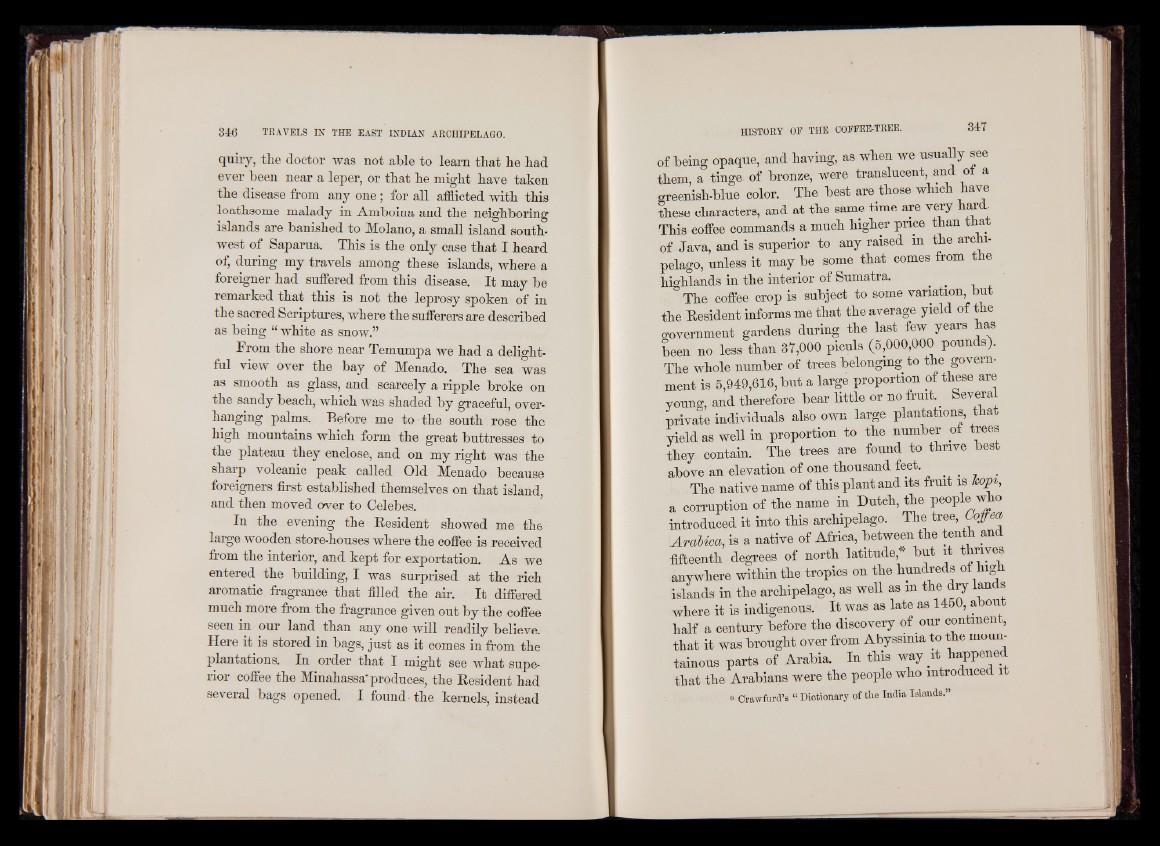
quiry, the doctor was not able to learn that he had
ever been near a leper, or that he might have taken
the disease from any one; for all afflicted with this
loathsome malady in Amboina and the neighboring
islands are banished to Molano, a small island southwest
of Saparua. This is the only case that I heard
of, during my travels among these islands, where a
foreigner had suffered from this disease. It may be
remarked that this is not the leprosy spoken of in
the sacred Scriptures, where the sufferers are described
as being “ white as snow.”
From the shore near Temumpa we had a delightful
view over the bay of Menado. The sea was
as smooth as glass, and scarcely a ripple broke on
the sandy beach, which was shaded by graceful, overhanging
palms. Before me to the south rose the
high mountains which form the great buttresses to
the plateau they enclose, and on my right was the
sharp volcanic peak called Old Menado because
foreigners first established themselves on that island,
and then moved over to Celebes.
In the evening the Resident showed me the
large wooden store-houses where the coffee is received
from the interior, and kept for exportation. As we
entered the building, I was surprised at the rich
aromatic fragrance that filled the air. It differed
much more from the fragrance given out by the coffee
seen in our land than any one will readily believe.
Here it is stored in bags, just as it comes in from the
plantations. In order that I might see what superior
coffee the Minahassa" produces, the Resident had
several bags opened. I found the kernels, instead
of being opaque, and having, as when we usually see
them a tinge of bronze, were translucent, and oi a
greenish-blue color. The best are those which have
these characters, and at the same time are very hard.
This coffee commands a much higher price than that
of Java, and is superior to any raised in the archipelago,
unless it may be some that comes from the
highlands in the interior of Sumatra. ^ _
The coffee crop is subject to some variation, but
the Resident informs me that the average yield of the
o-overnment gardens during the last few years has
been no less than 37,000 piculs (5,000,000 pounds).
The whole number of trees belonging to the government
is 5 ,9 4 9 ,6 1 6 , but a large proportion of these are
young, and therefore bear little or no fruity Several
private individuals also own large plantations, that
yield as well in proportion to the number of trees
they contain. The trees are found to thrive best
above an elevation of one thousand feet. .
The native name of this plant and its fruit is /wpt,
a corruption of the name in Duteh, the people who
introduced it into this archipelago. The tree, Ooffea
Arabica, is a native of Africa, between the tenth and
fifteenth degrees of north latitude,* but it t^ iv e s
anywhere within the tropics on the hundreds of lug
islands in the archipelago, as well as m the dry lands
where it is indigenous. It was as late as 1450, about
half a century before the discovery of our continent,
that it was brought over from Abyssinia to the mountainous
parts of Arabia. In this way it.happened
that the Arabians were the people who introduced it